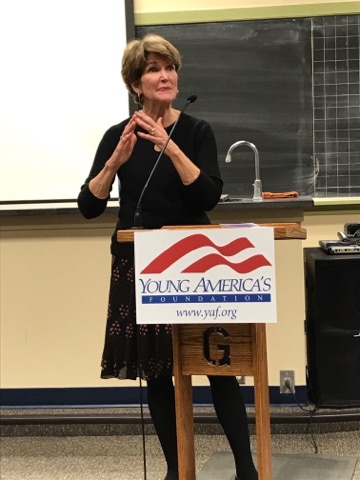
Angela “Bay” Buchanan spoke Wednesday on abortion and pro-life activism (Photo courtesy of Nick Arbaugh)
By Jeremy Porter, Staff Writer
Angela “Bay” Buchanan, conservative activist and former treasurer of the United States, spoke Wednesday evening about the abortion debate, and, specifically, her pro-life beliefs.
The talk, held in Mara Auditorium, was hosted by the Young Americans for Freedom at Gettysburg College. Officers from the Department of Public Safety were on site to check bags and college IDs and to monitor the flow of audience members entering and exiting the auditorium.
A member of the Young Americans for Freedom introduced Buchanan and provided information about her political experience. She received her undergraduate degree in mathematics from Rosemont College in 1971 and her master’s degree, also in mathematics, from McGill University in 1973. In 1981, she was presented an honorary law degree from Samford University. She served as the United States treasurer from 1981 to 1983 under former President Reagan. Appointed at age 32, she was the youngest treasurer in United States history. She managed her brother Pat Buchanan’s three presidential campaigns in the 1990s, and served as the senior adviser to Mitt Romney’s presidential campaign in 2012. Additionally, she was named “Woman of the Year” by Clare Boothe Luce Policy Institute in 2007.
Buchanan began her speech by praising college students nationwide for debating about political issues. She explained how she feels respectful disagreement is healthy and the only path to progress, and that seeing that among younger generations makes her optimistic for the future. She then quickly dove into the evening’s topic of discussion. Buchanan explained the fundamental question at the heart of the abortion debate: whether an unborn human is a bundle of cells or a child. Her pro-life views stem from her belief that the unborn, from the zygote phase onward, is still a human child. A self-proclaimed “champion of life,” she asserts that, since all human beings have the inalienable right to life, so does the developing child.
Buchanan went on to discuss how modern science and technology have made her argument clearer – ultrasounds allow us to witness the various stages of child development in the womb. She said that she does not understand how people can still deny that a life exists before birth. Quoting Mother Teresa, Buchanan stated that “if abortion isn’t wrong, then nothing is wrong,” since in her view abortion is fundamentally the robbing of one’s right to life.
In the second part of her speech, Buchanan addressed questions often posed by critics of the pro-life argument. She is frequently asked how so many conservatives can simultaneously be pro-life and support capital punishment. Buchanan acknowledged that there is indeed an inconsistency – who are we to determine that the unborn have the right to life and criminals do not – and that is why she no longer supports capital punishment.
However, she explained that many pro-choice supporters are equally inconsistent, because they will save the lives of criminals but will take away the lives of the unborn. In regards to questions about adoption, Buchanan said she sympathizes with women who have trouble giving away their babies. Nevertheless, she wants mothers who choose adoption over abortion to feel justified, because their decision still gives their children the opportunity to live happy lives.
Buchanan made it clear that she does not think women who have abortions are bad people, because she knows they are often in a crisis over the decision they have to make. However, she talked about the countless times she has met women who have undergone abortions and still cannot come to terms with their decision. Their emotional scars are often revealed when they see children the same age that their aborted children would be, or when they finally do give birth to a child, and they realize just how real and lasting the effects of their decision are. Seeing the state of these women, Buchanan explained, is what truly hits home for her.
Near the end of the talk, Buchanan took a few questions from the audience. One audience member mentioned how often times men are kept out of the abortion debate because they are not the ones going through the physical process, and asked how pro-life men should approach arguing against abortion. Buchanan replied that refusing to listen to male perspectives on abortion is “outrageous.” She suggested that pro-life men bring up the fact that the unborn child is the father’s as much as it is the mother’s. She also added that she has heard of plenty of men who go to counselling to cope with their child being aborted.
In a heated moment, one audience member asked how Buchanan would handle things if her granddaughter was raped and impregnated. Buchanan said that she would be there for her granddaughter through the entire pregnancy and would guide her in either raising the baby or putting the baby up for adoption. She even suggested that she would offer to raise the baby herself. Buchanan said if her granddaughter got an abortion, she would still love her. But she would never forgive herself if her granddaughter was emotionally scarred from the decision.
To wrap up her speech, Buchanan urged the students in the audience to always be vocal advocates for what they believe in. Too often, she said, we elect politicians who lack strong convictions and base their decisions on alliances, elections, and party politics. She urged “pro-lifers” and “pro-choicers” to approach each other and question the opposing viewpoint.
“The other side might ridicule you, and if they make you feel uncomfortable then you’re not ready,” she explained. “We all have an obligation to ourselves and to our country to stand up and speak out for what we believe in.”
